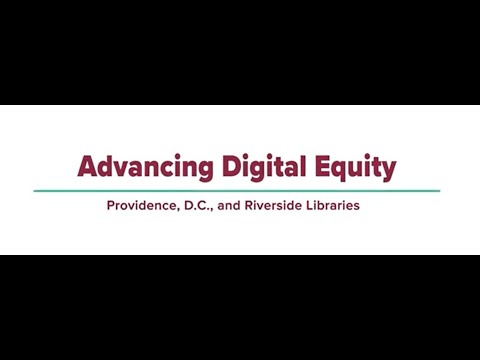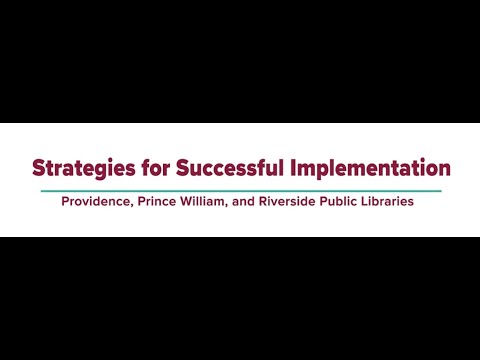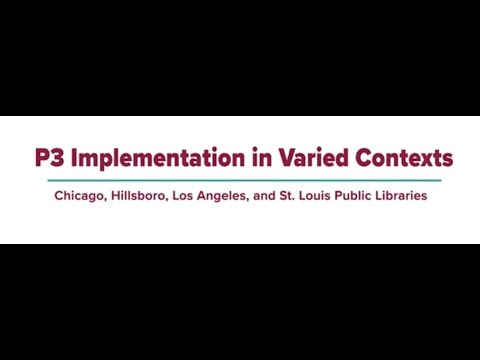Propagating Promising Practices
For Adult Literacy and Workforce Development at Libraries
Overview
Public libraries have vast unmet potential to increase the educational and workforce development opportunities for adults who want to develop their academic or work readiness skills. In the Propagating Promising Practices for Literacy and Workforce Development at Libraries (P3) project, nine public libraries from across the nation used technology-enabled practices to support adults in building their literacy, English language, and workforce skills and knowledge. The P3 practices help position public libraries as effective and welcoming hubs for lifelong learning, digital inclusion, and economic empowerment.
The need to build fluency in using technology to learn and to work is greater than ever. During the COVID-19 pandemic, employment, educational, and civic activities were moved to online platforms and many of these activities are likely to remain online. Adults need free, flexible, and accessible learning opportunities to attain and retain jobs that are infused with technology.
This website supports the in-person and virtual implementation of three practices: Learning Lounges, learning circles, and mobile learning. The collected resources include examples of how libraries designed their programming, as well as tools and information that others can use to determine their own interest and capacity to implement the practices in ways that serve their local contexts.
Lessons Learned
Despite barriers presented by the pandemic, the P3 project yielded several lessons about technology-enabled learning in libraries. These lessons cut across practices, guiding us to prepare adults with the foundational digital skills that will enable them to successfully engage not only with the practices, but with a range of life and work-based tasks.
- Library implementation of the P3 practices is most impactful when, in addition to addressing the immediate needs of patrons, it builds the digital skills and experiences that patrons can transfer to new learning. This entails filling gaps in knowledge and providing user experiences that lead to a deeper understanding of technology concepts and the ability to effectively use digital resources independently and with confidence.
- Libraries should plan for multiple contacts to effectively onboard adults to digital resources. New users need this level of initial support and ongoing opportunities for practice in order to become proficient in accessing and using digital resources and applications.
- Staff and volunteers need training to support patrons in using a range of digital and online resources. Training includes strategies for working with adults with limited digital literacy skills and familiarity with an array of common devices, applications, and features.
- Technology-supported learning is enhanced by library partnerships with education and community based organizations that embrace collaboration and help to recruit participants. Organizations such as one-stop employment centers, senior citizen centers, adult education providers, and public housing communities can give and receive referrals, serve as satellite locations, or offer complimentary services such as tutoring or job-coaching.
You can read more about these lessons learned in the Examples of Implementation section found on the Learning Circles, Mobile Learning and Learning Lounge pages of this website.
Reflections from our Partner Libraries
In the videos below, partners from the participating libraries share strategies in implementing the practices and discuss how their library contexts shaped their approaches. You can also learn how the P3 practices helped to advance digital equity goals of their libraries.
Project Partners
We’d like to thank our partners who have generously offered their time, knowledge, and expertise to develop this project.
Library Lead: Providence Public Library
Library Partners: Fuller Public Library, County of San Luis Obispo Public Libraries, DC Public Library, Riverside County Library System, Prince William Public Libraries, St. Louis County Library, Chicago Public Library, Los Angeles Public Library
Project Evaluator: World Education, Inc.
Advisors:
Grif Peterson, Executive Director, Peer 2 Peer University
Janet McKenney, Director of Library Development, Maine State Library
Kristin Lahurd, Interim Director, Office for Diversity, Literacy and Outreach Services at the American Library Association
Nicolette Baffoni, Adult Programming Coordinator at Rhode Island’s Office of Library and Information Services
This project is made possible in part by the Institute of Museum and Library Services (LG-95-18-0014-18).



